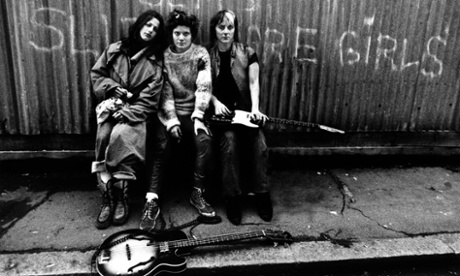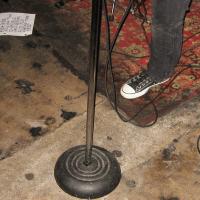 Untitled
Untitled
I'd love to get a conversation going about this... Read the article and post your thoughts!
From: http://www.theguardian.com/music/musicblog/2014/jul/03/punk-has-a-problem-with-women-why
Punk has a problem with women. Why?
For all its supposed celebration of diversity and inclusivity, punk doesn't allow women the visibility they merit

Earlier this week, the BBC aired a Culture Show special Girls Will Be Girls about the “female punk spirit”. Next week, Amy Oden’s documentary From the Back of the Room– a celebration of women in punk – is screening in London. It’s shown with a telling regularity here in the UK, and not just because it’s an excellent piece of film-making. It addresses an issue that punk just can’t seem to shake: female visibility, or the lack of it.
For all the films and programmes about women's role in punk, their recognition has been a problem since the 1970s and it looks like very little has changed. Women were a part of punk from the beginning – as musicians, promoters, venue heads, artists, provocateurs, community organisers, documenting their local scenes in zines, films, books and photographs. As LA punk veteran Alice Bag has pointed out, punk started out as an inclusive and diverse movement, but was quickly annexed by white dudes. Women have had to fight for space and recognition in punk ever since.
Even as the Sex Pistols and the Clash began their noisy quest for world domination, the radical all-girl punk band the Slits faced opposition at every level of industry, as chronicled in guitarist Viv Albertine’s excellently sharp memoir, Clothes, Clothes, Clothes. Music, Music, Music. Boys, Boys, Boys. In the 90s, riot grrrl rose up in protest at endemic punk scene sexism, while bands like Bikini Kill fought to reclaim the stage and the mosh pit. Two decades on, Alanna McArdle of Joanna Gruesome battles with sexist online trolls, Laura Jane Grace calls out the macho punk culture and both Syracuse, New York’s Perfect Pussy and Vancouver’s White Lung rage openly against the sexist boy majority. Same shit, different decade.
So why the groundhog day? Well, partly because the industry bros with power and influence aren’t doing all they can to change this inbalance. When Megan Seling interviewed Warped tour founder Kevin Lyman recently, challenging him over the persistent lack of female artists on the festival’s line-up, Lyman blamed women, saying there aren’t enough female bands out there to book.
Maybe there really are fewer women making punk music. But if that's the case, maybe it's because they see so few examples of female visibility at festivals like Warped that it doesn't occur to them that being in a band is an option. Maybe it's because men are more likely to have the time, confidence and disposable income necessary to make a band happen. Maybe it's because men don’t have to face constant objectification in the pages of guitar magazines, or the archetypal patronising music-shop dudes, or the steady line of snarky stage techies who prompted Sleater-Kinney’s Corin Tucker to write her 1997 Hey Sound Guy zine. Maybe it’s because women on the road face a set of obstacles that men in bands will never have to consider: sexual harassment, gendered violence, isolation, rape (and the subsequent blanket of silence and victim smearing that happens if the accused happens to be a punk hero). Maybe it's because the men who enjoy the freedom of the road aren’t worn down by the exhausting, pervasive sexism of promoters, venue managers and – should they garner the gaze of the music press – a media that is still, by and large, made by, for and about men. Maybe it's because the women who challenge the male hegemony in punk tend to get left out of the history books, prompting film-makers like Oden to retell the story.
Or maybe we only think there are fewer women out there because we only ever get to see the lucky few to whom industry gatekeepers deign to give a platform. Warped’sShiragirl stage – set up guerrilla-style by musician Shira in 2004 in response to Warped’s disproportionate boy/girl ratio – was a well-intentioned move, a way of ensuring women were present. But it's time that Warped – and others – change the way they support women in punk. As AbsolutePunk writer Kelly Doherty has pointed out, women-only stages, however benevolent, effectively ghettoize women:
The Shiragirl Stage is a way of the scene patting itself on the back and feeling super progressive when, really, it's yet another way of suggesting that women do not have a role to play in the important parts of the festival. The Shiragirl Stage will never, ever change the opinion of a young individual who believes that the touring circuit is something women should not participate in, as they won't look twice at the stage. How you change opinions is by giving females the chance to be in the same position as men and by showing people that they are just as capable.
Jennie Russell-Smith, musician and co-organiser of Rebellion festival, the UK’s biggest annual punk festival, agrees wholeheartedly. “This is the first time I’ve heard of the Shiragirl stage, and I’m appalled that someone would feel the need to have a stage where the girl bands are kept away from the male bands. Its ridiculous.” And the idea that there aren’t enough female bands out there? Bullshit, says Russell-Smith. “Years ago, I actively sought out women bands [for Rebellion line-ups]. Nowadays, because there are so many girl bands out there, I don’t even think about it.” Having women at Rebellion is important to Russell-Smith, but it’s not a quota thing, she says – its about diversity. This year’s Rebellion line-up includes Maid of Ace, the Duel, Vice Squad, Glitter Trash, the Ramonas, Louise Distras, Efa Supertramp, Healthy Junkies and Meg and Mog. “There are so many women getting out there and doing it, and it makes my heart sing.”
Russell-Smith grew up in north-east England, in a democratic local scene. “Us women were never made to feel inferior – but I know that’s not everybody’s experience, and I can’t speak for the women in London, or other parts of the world. I’ve been toying with the idea of a one-off Rebellion girls’ night out, a London gig, which would [celebrate] all-female or female-fronted bands. Everyone would be welcome audience-wise, men and women.” But ultimately, says Russell-Smith, there is a thin line between celebrating women and keeping a divide between the sexes.
So how do the punks with power ensure women are given equal footing? “The global punk family should stand together,” says Russell-Smith, “because some of us have opportunities that our sisters don’t. I’d also encourage women to contact Kevin [Lyman] in a proactive way about this. He’s welcome to come to Rebellion any time, and he can see how it works over here.”
____________________________________
"Go read a book and flunk a test." -Iggy









